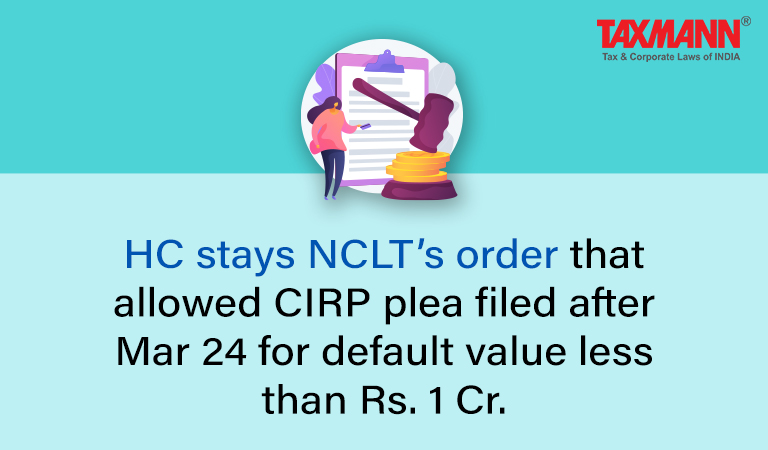HC stays NCLT’s order that allowed CIRP plea filed after Mar 24 for default value less than Rs. 1 Cr.
- Blog|News|Insolvency and Bankruptcy Code|
- 3 Min Read
- By Taxmann
- |
- Last Updated on 17 February, 2022

Case Details: Tharakan Web Innovations (P.) Ltd. v. National Company Law Tribunal, Kochi - [2022] 135 taxmann.com 187 (Kerala)
Judiciary and Counsel Details
-
- T.R. Ravi, J.
- Joseph Kodianthara, Isaac Thomas and Sharad Joseph Kodanthara, Advs. for the Petitioner.
- S. Manu and G. Harikumar, Advs. for the Respondent.
Facts of the Case
In the instant case, the petitioner -Private Limited Company was engaged in the activities of developing software and promoting advancement in the field of Information Technology. The respondent filed plea u/s 9 before NCLT for non-payment of dues by petitioner-company. Relying on Notification No.S4/1205 (E) dated 24.3.2020, the petitioner-Co. argued that the petition is not maintainable as Section 4 of the IBC was amended and the minimum amount of default was increased to Rs.1 Crore. The NCLT ordered that the application filed by the respondent be maintainable. A writ petition was filed challenging the order of the NCLT under the Insolvency and Bankruptcy.
The question before the Court was whether notification dated 24.03.2020 whereby the minimum amount of default was specified as Rs.1 Crore is prospective and would apply only to cases where the default occurred on or after 24.3.2020?
The Kerala High Court stayed an order passed by the NCLT refusing to declare that an insolvency plea filed after March 24 for default of less than Rs 1 crore was not maintainable.
“Section 4, after amendment on 24.3.2020 clearly says that Part II of the IBC shall apply to matters relating to the insolvency and liquidation of corporate debtors where the minimum amount of default is Rs.1 Crore. As per Section 3(12) of the IBC, “default” means non-payment of debt when whole or any part or installment of the amount of debt has become due and payable and is not paid by the debtor or the corporate debtor, as the case may be.
What is to be noted is that Corporate debtors who are in default of less than Rs.1 lakh prior to the amendment and Rs.1 Crore after the amendment, also are defaulters. However, whether a proceeding for insolvency or liquidation of such corporate debtor should be initiated would depend on the amount in default”
It is only if the Corporate debtor has incurred a default of at least the minimum amount stated in Section 4 that a proceeding under the provisions of the IBC under Part II can be initiated. The minimum amount of default is statutorily fixed, with power available to the Government to refix, up to a sum of Rs.1 Crore. Once the Government has exercised the said power by issuance of a notification fixing the minimum amount of default as Rs.1 Crore, the Section will have to be read by replacing the words “one lakh rupees” by “rupees one crore” Court said
High Court Held
The High Court held that from the date of the amendment, Part II of the IBC can apply only to matters relating to insolvency and liquidation of corporate debtors, where the minimum amount of default is Rs.1 Crore. Once that is the position, the application of Part II itself is taken away with effect from 24.03.2020 as far as defaults less than Rs.1 Crore are concerned and hence no application can be filed after 24.03.2020 regarding an amount where the default is less than Rs.1 Crore. By application of Section 10A, even in cases where the default is more than Rs.1 Crore, an application cannot be filed for a period of six months from 24.3.2020.
Disclaimer: The content/information published on the website is only for general information of the user and shall not be construed as legal advice. While the Taxmann has exercised reasonable efforts to ensure the veracity of information/content published, Taxmann shall be under no liability in any manner whatsoever for incorrect information, if any.

Taxmann Publications has a dedicated in-house Research & Editorial Team. This team consists of a team of Chartered Accountants, Company Secretaries, and Lawyers. This team works under the guidance and supervision of editor-in-chief Mr Rakesh Bhargava.
The Research and Editorial Team is responsible for developing reliable and accurate content for the readers. The team follows the six-sigma approach to achieve the benchmark of zero error in its publications and research platforms. The team ensures that the following publication guidelines are thoroughly followed while developing the content:
- The statutory material is obtained only from the authorized and reliable sources
- All the latest developments in the judicial and legislative fields are covered
- Prepare the analytical write-ups on current, controversial, and important issues to help the readers to understand the concept and its implications
- Every content published by Taxmann is complete, accurate and lucid
- All evidence-based statements are supported with proper reference to Section, Circular No., Notification No. or citations
- The golden rules of grammar, style and consistency are thoroughly followed
- Font and size that’s easy to read and remain consistent across all imprint and digital publications are applied



 CA | CS | CMA
CA | CS | CMA
